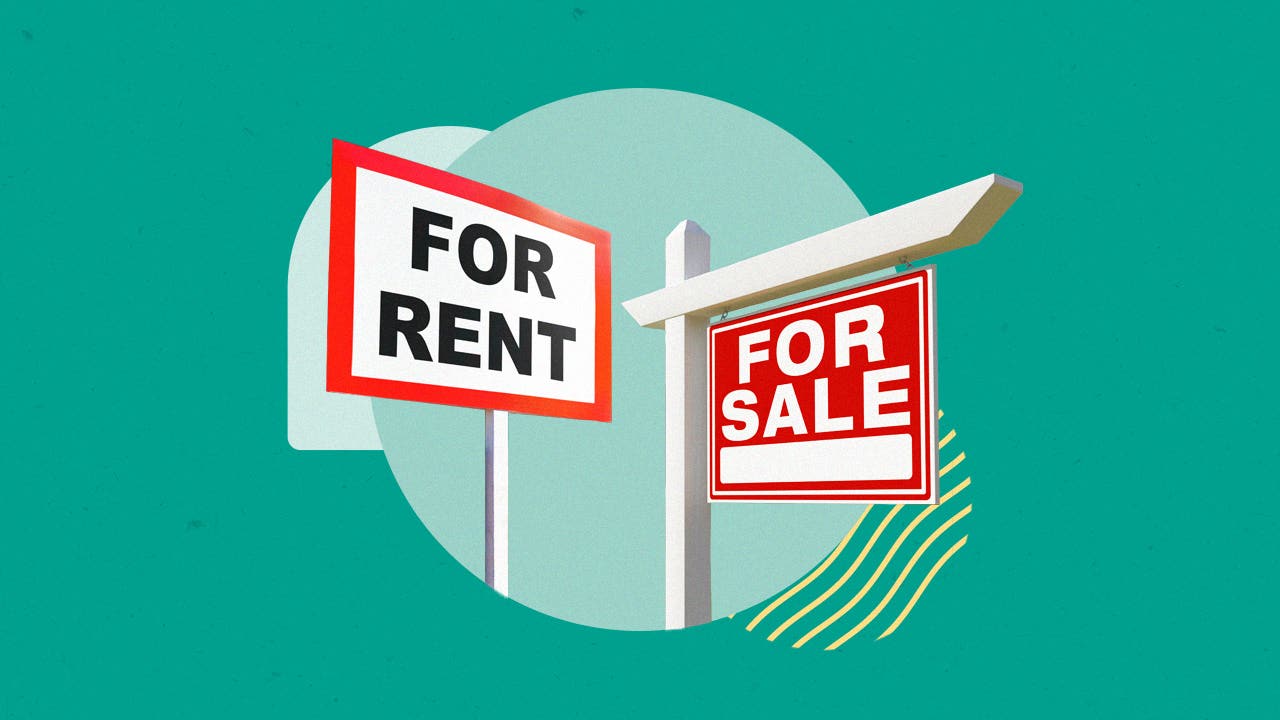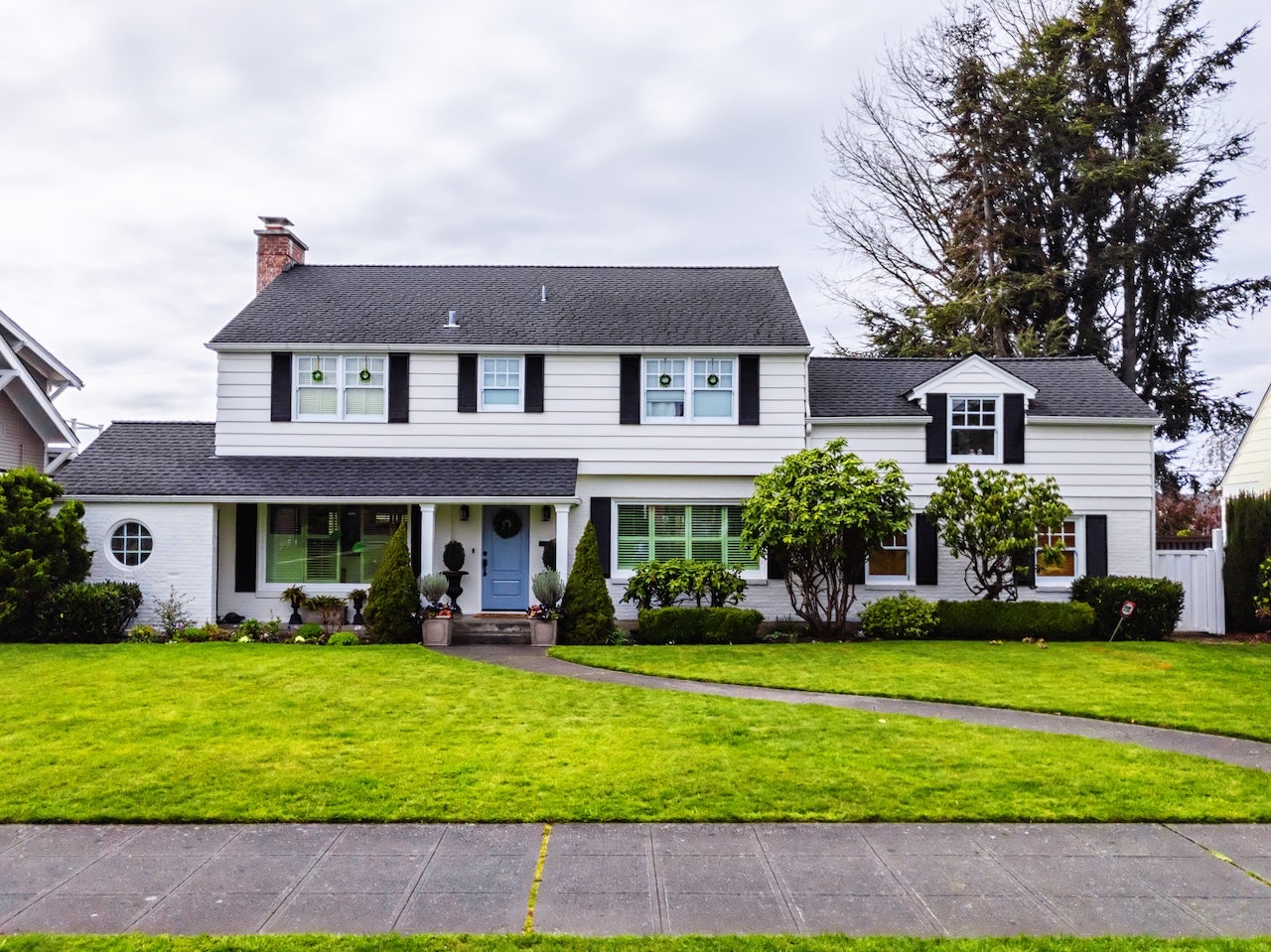Renting vs. buying a house: Which is right for you?

Key takeaways
- The decision to rent or buy might be primarily financial, but your lifestyle and future plans or goals should also be a factor.
- Renting offers more flexibility and less upfront costs, but it does not build equity and puts you at the whim of your landlord.
- While owning requires a large financial commitment and more responsibility, it also provides stability and potential for building equity.
To buy or not to buy? That is the question. While none of Shakespeare’s characters ever famously pondered this housing decision, plenty of Americans are thinking about it. And with today’s high home prices and high mortgage rates, a lot of them are landing on the “not” side of the equation.
Renting, on the other hand, can look a lot more appealing. Realtor.com data from the end of 2024 showed that the median asking rent in the U.S. had dropped to $1,695 — its lowest level since early 2022. If you’re on the fence about continuing to pay your landlord or becoming a homeowner, there’s no simple answer. Read on to understand the key considerations of renting vs. buying a house in today’s market.
Is renting really cheaper than owning?
If you’re living in a major metro area, yes. In fact, Bankrate’s 2024 Rent vs. Buy Affordability Study showed that it’s cheaper to rent than to buy in all 50 of the country’s largest metros. Part of that is due to the upfront costs: The down payment is a significant expenditure for homebuyers — so much so that it’s often the biggest hurdle to homeownership — and buyers have to hand over a chunk of cash for various closing costs as well. Meanwhile, renting a place may involve as little as putting down a security deposit.
In addition, renters have only their monthly rent to think about: Renting doesn’t require a down payment or a mortgage, and that freedom is appealing to many people. When you own a home, you’ll have a monthly mortgage payment that includes interest on the loan, along with a range of other expenses including property taxes and homeowners insurance. And if your down payment was less than 20 percent of the home’s purchase price, you’ll likely be on the hook for private mortgage insurance premiums too.
According to Realtor.com, the median sale price of a home in the U.S. sat at $402,502 at the end of 2024. A homebuyer who could afford to make a 20 percent down payment for a home of that price at a 7 percent mortgage rate would pay $2,142 per month for principal and interest, according to Bankrate’s mortgage calculator — that’s about $450 per month more than the median cost of rent.
Despite those daunting figures, every situation is different. Bankrate’s rent vs. buy calculator can help you crunch the numbers to estimate your potential costs for each path.
Other differences between owning and renting
Renting versus buying a home isn’t just about the money. It’s also about your lifestyle choices. Choosing to rent means you’ll enjoy a greater degree of flexibility to pack up and relocate as you like, while opting to own can provide a feeling of stability and community. Here are other key differences between the two options.
Building equity
Buying a home to live in shouldn’t be viewed strictly as an investment, but homebuyers can capitalize on the equity that accumulates over time. If your home value goes up, you’ll earn more when you sell.
The benefits of homeownership accrue over the long term through the accumulation of home equity.— Greg McBride, Bankrate Chief Financial Analyst
“The benefits of homeownership accrue over the long-term through the accumulation of home equity,” says Greg McBride, CFA, Bankrate’s chief financial analyst. “Building equity comes from paying down the mortgage balance as well as future price appreciation. But importantly, the equity accumulation isn’t pure profit, but rather works to offset some of the many costs of ownership such as taxes, insurance, debt service, maintenance and repairs.”
That said, a home purchase is a big commitment, and you likely won’t accumulate a large amount of equity right away. In fact, with closing costs, it generally takes several years to recoup your money and see any equity gains.
Planning for the future
When you’re renting, your landlord can opt to increase your rent and send shockwaves through your finances. They might even decide to sell, which could potentially leave you in the lurch. But if you buy a home with a fixed-rate mortgage, you won’t have to worry about fluctuating monthly payments as you could with rising rents. That kind of reliability can make budgeting and planning a lot easier.
Tax implications
Another factor for prospective buyers to consider is potential tax benefits. If you itemize deductions, you could lower your federal tax liability by taking the mortgage interest deduction. Talk to a tax professional about whether the mortgage interest deduction — the first $750,000 in mortgage interest for couples filing jointly; $375,000 if you’re filing solo — will make an impact on your bottom line.
Depending on where you live, you may be able to squeeze a small benefit from renting, too. For example, in Indiana, an eligible renter can deduct up to $3,000 of rent from state taxes. Other states offer tax credits based on other criteria such as age or earning a certain amount of income.
Maintenance costs
This is a topic that makes owning feel a lot less fun than renting: If something in your house breaks, there’s no landlord to deal with it. You own it, so you have to maintain it. This is part of why lenders like to see a substantial cushion in case of emergencies — and why regular upkeep costs should always be factored into your homebuying budget. Even if you’re handy and plan to do your own upkeep, you might not be able to commit to this level of maintenance over time. Be sure to get a home inspection to be aware of problems and potential red flags before you buy a home.
Insurance requirements
Any homebuyer who’s financing the purchase will be required by their lender to secure a homeowners insurance policy. Depending on where you live, you might also be required to have additional coverage for floods, wildfires or earthquakes. That means living in a warm-weather, coastal paradise — like Florida or California — could cost you significantly more than you bargained for.
For tenants, it’s smart to have renters insurance, which protects personal possessions in situations like theft or fire and offers some liability protection. But renters insurance is much more budget-friendly than homeowners insurance.
Renting vs. buying a house: Pros and cons
Buying
Pros
- Builds equity
- Builds credit
- No landlord
- More stability
- Potential tax benefits
Cons
- Requires substantial money upfront
- Potential to lose money in a market downturn
- Responsible for the cost maintenance and repairs
- Have to sell or find a renter if you need to relocate
- Extra costs beyond mortgage payments
Renting
Pros
- Significantly smaller upfront costs
- Easier to get approved for a rental than for a mortgage
- Flexibility to relocate easily
- Not responsible for repair costs or property taxes
- Ability to build credit
Cons
- Builds equity for the landlord, not you
- Landlord can raise rent or require you to relocate sooner than preferred
- Less freedom to design or customize things to your liking
- Repairs may not be carried out to your liking
- Limited tax benefits
Should I rent or buy? 7 key questions
Here are seven important questions to ask yourself when considering renting vs. buying a house:
- How much can I afford in monthly housing costs?
- Am I prepared for a long-term investment?
- How long do I plan to stay in this home?
- Do I want stability or flexibility?
- Can I afford home repairs/maintenance costs?
- What are my financial, career and family goals? (For example, do you plan to relocate for work? Go back to school? Expand your family?)
- Is homeownership in my preferred neighborhood achievable, or would I need to expand my search zone?
Bottom line
The answer to the rent vs. buy debate isn’t cut and dried. It’s important to evaluate your current life situation and how much it’s likely to change in the immediate future — if you are moving to an unfamiliar city, have an unstable job situation or don’t know what neighborhood will feel like home, renting can be a great option. However, if you’re looking to settle down and plant roots, buying is likely a better option. Sure, you may pay more each month, but in the long run, you’ll accumulate equity that can put you in a strong position when you’re ready to sell. If you’re on the fence about which is right for you, it may be helpful to speak with a local real estate agent who knows your market well. An experienced agent can help you weigh your options and make a more informed decision.
You may also like

Pros and cons of leasing vs. buying a car


Should I buy a house now, or wait?

Should I sell my house or rent it out?



